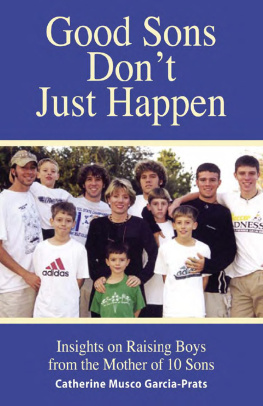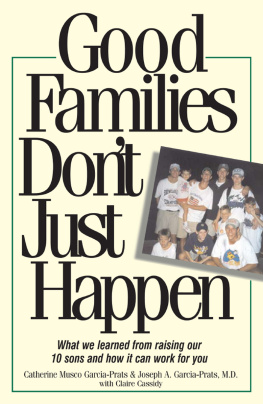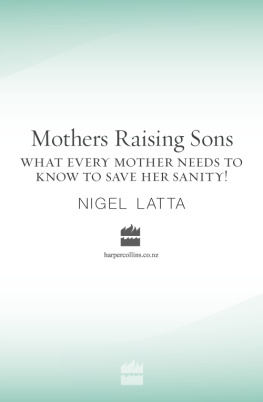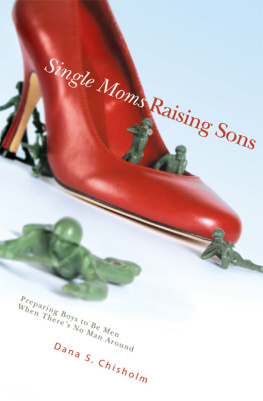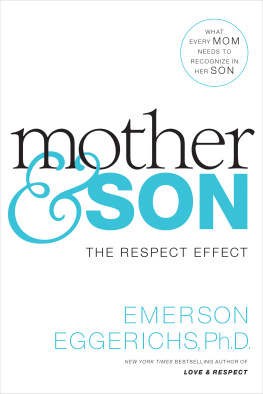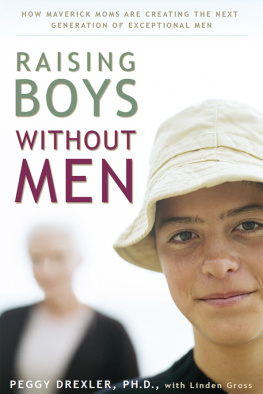
Also by
Catherine Musco Garcia-Prats and Joseph A. Garcia-Prats, M.D.
Good Families Dont Just Happen:
What we learned from raising our 10 sons and
how it can work for you
Good Marriages Dont Just Happen:
Keeping Our Relationship Alive While Raising Our Ten Sons
By
Joseph A. Garcia-Prats, M.D. and
Sharon Simmons Hornfischer, R.N., B.S.N.
What To Do When Your Baby Is Premature:
A Parents Handbook for Coping with High-Risk Pregnancy
and Caring for the Preterm Infant
Special thanks to Maria Illich, Ann Boehm,
Cathy Brown, Veronica Cheung, and my literary
agent, Jim Hornfischer.

Copyright 2009 Catherine Musco Garcia-Prats
All rights reserved. This book, or parts thereof, may not be reproduced in any form without permission from the publisher; exceptions are made for brief excerpts used in published reviews or articles.
Published by
Bosco Publishing
5502 Lymbar Drive
Houston, TX 77096-5022
ISBN: 978-0-9763294-1-1
Library of Congress Control Number: 2008935750
Printed in the United States of America
For information on quantity discounts for bulk purchases contact
Bosco Publishing
Web site: www.boscopublishing.com
Telephone: 713-721-1582
Fax: 713-721-9147
With love to Joseph,
my husband and the father of our sons:
Tony, David, Chris, Joe Pat,
Matthew, Mark, Tommy, Danny,
Jamie, and Timmy
Table of Contents
Introduction
Richard Nevle
Principal
Strake Jesuit College Preparatory
Houston, Texas
My first encounter with Cathy Garcia-Prats and her sons came one autumn afternoon when her first son was a freshman at Strake Jesuit College Preparatory. She had come by to pick him up, arriving early on what was to be the first of hundreds of trips to our campus. The students were still in class, so Cathy was standing on the edge of one of our practice fields watching the gaggle of small boys she had brought with her on her afternoon route. I was an assistant principal then, yet I had heard of the G-Ps. Strake Jesuit is an all boys school and we knew about Cathy and Joe and the eight sons they had at the time. I remember telling her that day, So those are all your sons. Somewhat shocked, she looked at me and exclaimed, Oh no! That one in the goal is a neighbors child.
The neighbors child was, of course, welcome and probably delighted to be included in a family that eventually grew to ten boys. There are now two Garcia-Prats at Strake Jesuit. The youngest brother is a freshman; he practically grew up at Strake Jesuit. Before he was born his parents, though busy with a large family and committed to demanding careers, always found time to be there for their sons games, banquets, and parent-teacher nights.
At one of the very first athletic banquets the Garcia-Prats family attended, I remember wondering how one mom and one dad were going to keep order with the table full of active, busy boys ranging in age from infancy to the early teens. I fully expected Joe and Cathy to divide and conquer somehow or another by placing themselves among the boys so as to quell any outbreaks of boys being boys. But they did not; rather, the parents sat next to one another as adultsas a couplewhile their sons were arranged by age, the older ones attending to their younger brothers. They had a good time cheering for their brother, and they did so with polite, sincere enthusiasm when he was recognized by his coaches.
Often we had as many as three Garcia-Prats enrolled at Strake Jesuit at one time. On such an occasion, three of them had all come to classes latethey were making a television appearance with their mom shortly after the publication of her first book. As they checked in at the Dean of Students office, the Garcia-Prats principle was once again in operation. When the Deans assistant started with the oldest of the three, he immediately stepped back and told her, No, youngest first. To this day, now that there are grandchildren in the Garcia-Prats family, that same focus on taking care of the ones who need it most is still evident among the brothers as they pass their niece and nephews from one brother (one uncle) to the next with practiced care.
Even though they share a name, each Garcia-Prats is a unique individual. Nonetheless, each has a remarkably strong sense of care and responsibility. Despite being characteristically considerate, they are fierce competitors. Even before they were students at Strake Jesuit, they came to soccer games and cheered for their brothers. At half-time they would even take over the field for a game of their own. Once when Tommy was a freshman, his team had managed to get an invitation to a Junior Varsity tournament. Somehow they battled their way to the finals. That last game was played in nearly freezing weather. The small freshmen battled their way to a tie and then took the game into overtime. Tommy seemed to be all over the field. Though far smaller than his competitors, he more than held his own. The older team, embarrassed by its inability to put these freshmen away, resorted to using their larger size, playing more and more aggressively as they bounced their freshman opponents around the field. Finally, the older and bigger team scored, the game ended, and Tommy joined his teammates in congratulating the winners before falling to his knees on the field. There wasnt a soul in that stadium who didnt know who was the hero of that game.
Cathy and Joe did not raise, nor are they now, raising their sons in a vacuum. Their sons live in the same dangerous world that every young man and boy in this country facesand the family faces those threats and dangers head on, not only with discipline, but also with love, care, and support. What is ironic is that now that their sons are growing older, it becomes very clear that one of the great sources of support in raising all of those boys was, and is, all of those boys. Their older sons are now young adults and leaders in their professions and communities. For example, Cathy and her son, David, shared a place on the founding advisory board of the Cristo Rey Jesuit College Preparatory School of Houston. Watching her son do well is no surprise for Cathy, but it is clearly a joy. Also, now that Tony has become a physician, it is easy to see that same joy (and no little pride) in hearing Joe, an outstanding physician in his own right, tell the story of his being known as Dr. Garcia-Pratss dad among the new generation of physicians with whom he now works.
There is a sense of responsibility and duty visible in the Garcia-Prats brothers to a man. Of course they make mistakes, but they face them, reflect on what they can learn from them, and then move on. Character is not something you so much teach as you build. It begins with developing a sense of self-worth. When parents and siblings let you know by their presence, their actions, and their support that they care about you, then you know not only that you are loved but that you have the power to love and care for other people as welland that you should. Boys thrive on challenges, and leading a life in which other people depend on you to do your jobto know your duty and do itis just the kind of challenge that gives a boy not only a sense of worth but also a sense of accomplishment. The Garcia-Prats are an accomplishment.
Prologue
Its a Boy! Now What?
Next page
